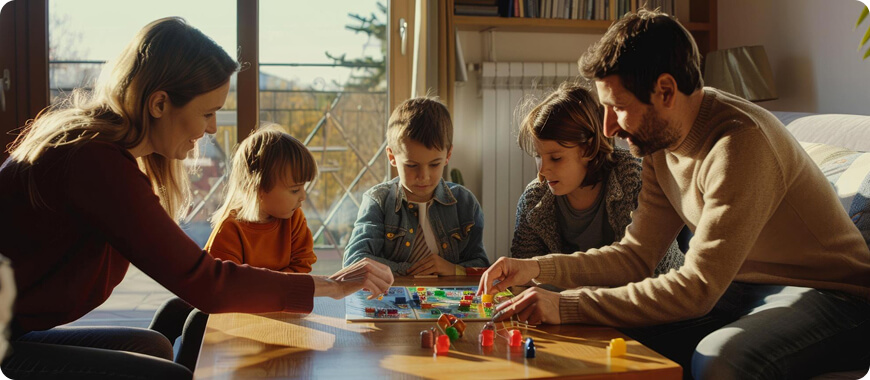Raising a bilingual child in Spain is more than just teaching them two languages — it’s about giving them the tools to thrive in an increasingly global world. Many expat parents want their children to grow up speaking English while also feeling at home in Spanish culture.
Let’s explore how you can support your child’s bilingual journey — even if you’re not a language teacher yourself.
Why Living in Spain Is the Perfect Opportunity for Bilingual Kids
Spain offers a unique setting for raising bilingual children. Outside the home, Spanish is everywhere — from playground conversations to school lessons and local shops. That means your child gets daily exposure to one language without any effort at all.
The challenge, of course, is making sure they also hear and use English regularly. Since English isn’t widely spoken across most parts of Spain, it’s up to parents to create a space where their child feels comfortable using it.
This is where your family plays a key role. Whether you're originally from the UK, Ireland, or another English-speaking country, you have the power to shape your child’s language environment. You can make English feel natural and necessary — not something they only use when forced.
Even small efforts, like reading bedtime stories in English or watching cartoons together, can lead to big results over time.
The Role of Family in Supporting Two Languages at Home
When it comes to raising bilingual children, the home environment matters more than anything else. Children learn by listening and imitating, so if they hear both languages being used naturally around them, they’ll begin to pick them up too.
Some families choose the “one parent, one language” method, where each parent consistently speaks only one language. Others prefer to speak English at certain times — such as during meals or weekends — while using Spanish the rest of the time.
Whichever approach you take, consistency is key. It’s better to use English regularly in a few specific situations than to switch back and forth unpredictably.
Extended family members can also play a part. Even if they live far away, grandparents and cousins can send voice messages, record videos, or join video calls in English. These small moments add up and give your child more opportunities to interact with native speakers.
Language Balance: How Much English Should Your Child Speak?
One of the most common questions parents ask is: how much English should my child be using? Will they fall behind academically? Will they struggle to communicate with relatives back home?
Research shows that bilingual children do just as well — and often better — than monolinguals. Speaking more than one language actually boosts brain development, improves focus, and helps with problem-solving.
To give your child a solid foundation in English, aim for regular interaction. Ideally, they should hear and use English for at least 30% of their day.
That might include:
- Reading books together
- Watching English cartoons or films
- Talking with friends or relatives
- Taking online English classes
Every bit counts. Even short daily interactions in English can lead to fluency over time.
Children who grow up bilingual are more likely to become confident communicators, open-minded thinkers, and culturally aware individuals.
Using School and After-School Activities to Boost English Skills
Choosing the right school plays a big role in supporting bilingualism. In Spain, there are many options, including international schools, bilingual public schools, and private language academies offering English lessons after school.
Look for institutions that offer real opportunities for conversation — not just grammar exercises. Drama clubs, debate teams, and book groups are great ways for children to practice speaking naturally.
If your child attends a Spanish-only school, don’t worry. There are still plenty of ways to build English skills outside class. Private tutoring, summer camps, and online courses can fill in the gaps and keep your child motivated.
Learning English Through Culture: Festivals, Books & More
Language isn’t just about words — it’s also about culture. Celebrating British traditions can help your child connect emotionally with English.
Try celebrating Halloween with spooky stories, Christmas with carols, or Easter with themed crafts. These events make English feel fun and meaningful.
Reading English books together is also powerful. Whether it’s picture books for younger kids or chapter books for older ones, stories help children pick up new vocabulary and expressions naturally.
You can also explore English music, films, and games. These cultural elements make learning English exciting and relatable.
Children who see English as part of their identity are more likely to continue using it throughout life.
Online English Classes: A Game-Changer for Expat Families
Sometimes finding a native English teacher locally isn’t easy. That’s where online English classes come in.
At Learnlink, we offer live, interactive lessons taught by qualified teachers from the UK. Our courses are designed especially for children aged 4–12 and follow the British curriculum.
What makes our lessons special is that they’re engaging and personal. Kids aren’t just watching videos — they’re talking, playing, and interacting with real teachers and classmates.
Online learning is flexible, affordable, and effective. And because our lessons are live, children get real-time feedback and build confidence speaking with others.
At Learnlink , we help families like yours build strong language foundations through engaging online English lessons designed for kids. In this guide, you’ll find practical strategies that work, based on real-life experiences and research-backed methods.
Science-Backed Strategies for Successful Bilingual Raising
Experts agree that consistent, meaningful exposure is the key to raising bilingual children successfully.
Talk to your child in English regularly, read aloud every day, and encourage friendships with other English-speaking kids. Use technology wisely — apps, audiobooks, and educational videos can all help.
Most importantly, let your child know that being bilingual is a superpower. Praise their efforts, celebrate progress, and avoid putting pressure on them to be perfect.
Children who feel proud of their language skills are more likely to keep using them.
Common Mistakes Parents Make When Teaching Two Languages
Even with the best intentions, mistakes happen.
Switching between languages too often can confuse children. Constantly correcting their mistakes can discourage them from speaking. Forcing English too much can actually push them away from using it altogether.
Instead, focus on creating a positive, low-pressure environment where your child feels safe to experiment with both languages.
And remember — it’s completely normal for children to mix languages sometimes. Code-switching is a natural part of the learning process.
Building a Support Network: Other Bilingual Families in Spain
Connecting with other expat families can be incredibly helpful. Sharing tips, resources, and experiences makes the journey easier — and more enjoyable.
Join local or online groups where parents talk about raising bilingual children, finding English tutors, and navigating the Spanish education system.
Having a community gives you emotional support and practical advice. Plus, it helps your child meet other kids growing up bilingual.
Celebrating Progress: How to Track and Encourage Your Child’s Bilingual Journey
Tracking your child’s progress doesn’t mean tests and exams. Look for signs like:
- They tell stories in English
- They understand and respond to questions
- They ask for things in the correct language
- They enjoy watching English cartoons without subtitles
Celebrate these milestones. Let your child know how proud you are.
If you ever feel unsure about your child’s level, consider booking a free assessment lesson with a qualified teacher. At Learnlink, we offer this service to help parents understand where their child stands and how to move forward.
Final Thoughts: Raising a Bilingual Child Starts Today
Raising a bilingual child may seem challenging at first, but with the right strategies, support, and mindset, it’s entirely achievable — especially in a country like Spain.
By making English part of your daily life, choosing the right educational tools, and connecting with others, you’ll help your child thrive in both languages.
And remember — you don’t have to do it all alone. At Learnlink, we’re here to support your child’s language journey every step of the way.
Ready to take the next step?
Start with a free trial class and discover how our expert teachers can help your child speak English confidently and joyfully.











